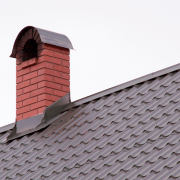What is a Chimney Liner and Why is it Important?
Your chimney plays a vital role in the safe use of your fireplace or wood-burning stove. Many homeowners are surprised to hear that poorly-maintained flues and chimneys are actually one of the common causes for home fires. When it comes to your wood or gas-burning appliances, there are many parts that go into keeping your home safe, including the chimney liner.
It’s not uncommon for chimney installers and sweeps to hear “What is a chimney liner?” Despite being a critical component to the safe operation of your fireplace, many homeowners aren’t even aware of them. This is due in part to how long they can last – up to half a century, in some cases. If you haven’t owned your home for too long, you likely haven’t had to think about it. So, if you’re wondering what chimney liners are and why they’re so important, read on to learn more!
Protects You from Accidental Fires
One of the most essential functions of a chimney liner is to prevent the risk of accidental fire. While chimneys are designed with material that won’t catch on fire, they sit right against the rest of your home. Support structures or combustible framing near the chimney can ignite if the heat from the chimney transfers over to them. Chimney liners limit the heat transfer, which can prevent these fire hazards from existing.
It’s possible for adjacent woodwork or other combustible material to catch fire in just a few hours when an active flame is sending heat through an unlined chimney. This is why it’s critical to have annual chimney inspections, among the other risks from a deteriorating or damaged chimney.
Preventing Damage to Your Masonry
While we tend to think of bricks as strong and solid, it’s quite porous – especially when you factor in the mortar that keeps bricks together. When you have an active flame in your fireplace or stove, the combustion creates a variety of corrosive byproducts. Over time, this corrosion eats away at the mortar joints and allows for rapid heat transfer to nearby combustibles. If this happens, you will eventually experience dangerous problems, like carbon monoxide leaking into your living space.
Chimney liners protect your masonry by adding an additional layer of defense. Depending on the type of liner you use, they can be far more resilient to these corrosive substances than typical brick and mortar.
Give Modern Appliances a Correctly-Sized Flue
Many modern fireplaces and stoves are designed with a specific flue size in mind. When replacing older fireplaces or installing new stoves into your home, chances are, your existing chimney or flue won’t be exact. Not only does this impact the function of the appliance, but it could lead to the same dangerous risks as having no liner at all. When you upgrade, make sure you talk to a professional about installing a metal chimney liner to go with it.






